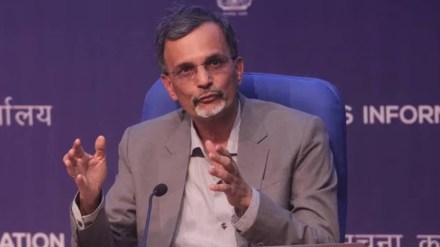Chief economic adviser V Anantha Nageswaran on Monday said monetary policy is a short-run macro aggregate demand management tool, which can’t manage supply-side food shocks. The Economic Survey has put the idea of excluding food from inflation targeting of the Reserve Bank of India for a debate, Nageswaran said addressing media queries on the survey. Edited excerpts by FE’s Prasanta Sahu.
If private investment continues to be weak, how do you expect jobs will be created?
Private sector capital formation has picked up in the last three years. Investment in machinery, equipment and intellectual property products have recovered more in the last two years. (However), the private sector may be a risk factor. If you have seen the excess capacity in China and the way the global environment is evolving, if the private sector were to turn cautious, the private sector capital formation growth rate may slow down. The private sector needs to do its bit in the middle to get employment to the level that could be required for the increasing workforce.
You said corporate sector should be mindful that AI impact on jobs…
We don’t know whether AI will take away a lot of jobs or not. Jobs related to business process outsourcing in the short run may be under threat, but AI might actually turn out to be a job booster, complementing to labour in higher-skilled jobs. We need to be mindful of the possibilities, and we need to make sure that as we deploy AI, we also prepare the population to be able to participate in it by redesigning curriculum, by creating in-house courses, etc, to make them AI employable and AI compatible.
The survey seems to have rooted for targeting inflation without food. With more than 40% of the CPI outside any targeting framework, can it really be called an inflation targeting framework as large and persistent food shocks can spill over to non-food segment also?
I would say that these are very fair questions. If you look at monetary policy, it is a short-run macro aggregate demand management tool, not a tool to manage aggregate short-term supply and food shocks that are predominantly supply shocks. So, it’s a bit unfair to burden a central bank with controlling inflation when it contains a component that is not under its control. So, if I have given a target over which I have no control and I’m in the private sector, I would be talking to my management and saying, I can’t do anything about it as it requires somebody else to pitch in. That somebody else also has other considerations and stakeholders to consider. This issue is not peculiar to India. Many other countries are also debating whether they should target headline or core inflation. As we become $7 trillion or 10 trillion economy, the share of food will come down, and then the distinction between headline inflation and core inflation will disappear. So, for a large developing economy with a huge share of food item, even though it has come down over the years, it is a very relevant question to raise.
Are you suggesting a relook at the China Plus One strategy?
I’m asking for re-examination. A balance is required between importing goods and importing capital. Brazil and Turkey banned the import of vehicles, but then they incentivized them (the Chinese) to invest in their own country. We have a large trade imbalance with China. So it’s a question of choosing the right balance between importing on a trade route and importing on a capital route.
What is your view on increasing retail participation in the equity market?
The participation of retail investors in the capital market has actually created a very good buffer for Indian markets in general, given an additional saving option or additional deployment of savings for our households in the last four years. So, capital market participation by retail investors is a very healthy and a very welcome thing. Speculative trading in futures and options are not exactly benefiting households or the purpose of capital formation in the economy.
How can low greenium in India’s sovereign green bonds be addressed?
The greenium (premium for green bonds) is an issue that plagues all green bond issuances across the world. It is not that something is lacking in India’s offering. We have a very high green rating. Greenium for India is fairly of the same order that you will find elsewhere as well. It is only going to improve.
